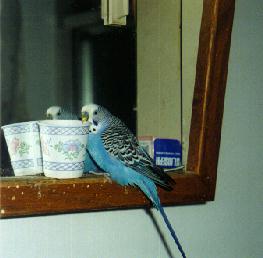Technical
Papers
News
Budgie
Guests
-Pico
Navigate Birdie's Web Site
What Birdie Has Taught Us
Birdie, with my wife's help, provides many clues about an environment that leads to a long, healthy, and joyous life for Budgies. What follows is some of what I've learned so far, primarily from Birdie and one of his predecessors, Herbie. We've lived with others whose presence have also contributed to our knowledge. When I use the word "we", I refer to my wife (Sharon) and me. When I use "him" or "he", I refer to Birdie. Birdie is often referred to as "He."
- Budgies are smart. The term bird brain is both accurate and misapplied. Birds, being tasty prey in the wild, must be quick witted, very observant, and cautious to survive. In a generally safe environment, they are also curious. What makes me think they are smart? They learn by observation and do so quickly. For example, the birdie instinctively distrusts new objects. If I hold such an object near me to show it is safe and then towards the bird for a couple of cycles, the bird will approach the new object cautiously but with great curiosity. If Birdie sees me eating something, he will investigate to see if it interests him as food. The bird classifies objects in categories and treats them accordingly. He recognizes words like "apple" and "cantaloupe" as good things to eat and clearly expects to be served when the subject is mentioned. Birdie also instinctively distrusts Ginny, our bird focused cat but trusted Chubby, Ginny's not very interested predecessor.
- Budgies are very similar to little kids and it helps to think of them that way. They learn quickly, they love toys and people. They like attention and if they don't get their own way they get mad but forgive quickly. Whether they mimic human speech or not, they pick up a human vocabulary (limited) and develop their own sounds for objects or actions. Their vocabulary is not extensive but probably adequate for their needs.
- These birds have many different emotions. On one occasion, Birdie got mad a Sharon, blew his cork, and began to squawk very loudly. He made a point of flying to me, venting his frustration by squawking and running in circles. He then perched on one of my fingers, jabbering away. There was no question he clearly played me against Sharon.
- Budgies are individuals. They enjoy different activities and "toys." They all like mirrored objects and freedom. The budgies I've know that lived the longest had periodic "out of the cage" freedom and enjoyed human company. They like to play with toys and people simultaneously. Examples of team playing include frequent "tugs of war" for coins, or toys being held for the bird.
- Parakeets seek out humans for company, and for comfort when not feeling well or tired.
They like to be greeted and greet their biped friends after an absence. When ignored, they
bite. First without pressure and, if they don't get you attention...harder until there is
no question they have your attention..

Birdie is un-impressed by objects that are labeled toys. To him, everything and everyone is a toy. The surveillance camera shot of a "cup raid" should be proof that toys don't have to be mirrored. When the family makes the mistake of leaving the medicine cabinet open, the bird empties as much as he can into the sink but occasional scores two points by dumping something into the toilet. I've heard that the seat should be left down. Now I know why. The cup came out of the cabinet and somehow was transferred to the other side of the bird. When Birdie was younger, he would make a gargling sound in little paper cups, apparently enjoying the deep resonance. - The more toys the better. With access to a wide variety of toys, they are extremely busy and happy. Budgies get bored with the same old toy(s) and stop playing with them after while, often not to return to them. It is a good idea to introduce a new toy now and then. They also like order, of sorts. Move something that they are accustomed to being in one position, and if the bird can, it will restore order. I've even seen this behavior in a bird that hated or feared me and spent his/her (I don't remember) life kind of sulking. The birdies have no objection to creating one's own disorder.
- Diet is so very important. We lost a wonderful budgie, Herbie, a number of years ago at about the age of 3. Herbie was diagnosed as being anemic. Not knowing any better, we fed him boxed Parakeet food sold under a famous brand name starting with H. The vet we took him to gave him a vitamin shot, sold us some expensive pellets, and told us to limit the bird food to the pellets. Herbie wouldn't touch them. The vet told us after we called in panic the following day to stick with the pellets. He would eat when he was hungry. After two to three days of fasting, we put him back on seed. He lasted a few more months.
What works for us: See Health & Happiness tips.
To my personal home page
Copyright Jerold H. Feinstein, PE 1997-01 All rights reserved; contact for permission to use
This page was last updated on 04/01/01 and is located at http://geocities.datacellar.net/CapeCanaveral/Hangar/6056
This page hosted by ![]() Get your own Free Home Page
Get your own Free Home Page